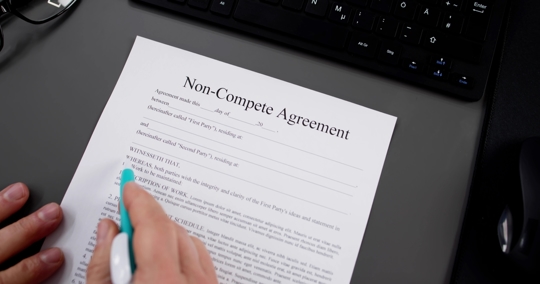Enforcing a non-compete agreement in Florida involves a combination of understanding the legal framework, practical steps to ensure compliance, and, when necessary, pursuing legal action. As a business owner, it's crucial to recognize that while non-compete agreements are enforceable in Florida, they must meet specific criteria outlined under the law to be considered valid. This article will give you a comprehensive overview of enforcing a non-compete agreement in Florida, offering both legal insights and practical advice.
Understanding Florida's Legal Framework for Non-Compete Agreements
Under Florida Statutes § 542.335, non-compete agreements are subject to strict scrutiny but are enforceable if they are reasonable and protect legitimate business interests. Key elements include:
- Legitimate Business Interests: The statute enumerates several legitimate business interests that can be protected by non-compete agreements, including but not limited to trade secrets, confidential business information, and relationships with existing or prospective customers. It's critical to explicitly identify the interests your agreement aims to protect and ensure they align with those recognized by Florida law.
- Reasonableness Criteria: The agreement must be reasonable in terms of duration, geographic scope, and the line of business restricted. Florida courts have generally accepted non-compete durations of up to two years as reasonable. However, the geographic scope and line of business restrictions must closely relate to the area and manner in which the company operates to be enforceable.
- Written and Signed Agreement: The non-compete agreement must be in writing and signed by the employee. Oral agreements or implied contracts are not enforceable under Florida law for non-compete purposes.
Steps to Enforce a Non-Compete Agreement
1. Review the Agreement for Compliance
First, ensure the non-compete agreement is legally sound and compliant with Florida statutes. This includes:
- Checking Specificity and Clarity: The agreement should clearly define what constitutes a breach, including specific activities and companies considered competitive. This clarity helps prevent ambiguity in enforcement and litigation.
2. Document the Breach
If a breach is suspected:
- Gather Concrete Evidence: Compile emails, social media posts, employment announcements, or other documents that prove the former employee is working in violation of their non-compete terms.
- Record Losses: Document any loss of business, clients, or proprietary information directly linked to the former employee's breach.
3. Attempt to Resolve the Issue Amicably
Engage with the former employee to seek a resolution:
- Direct Communication: A personal discussion might resolve misunderstandings and reaffirm the non-compete's terms without further conflict.
- Negotiation: In some cases, modifying the agreement's terms may address concerns while still protecting the company's interests.
4. Send a Cease-and-Desist Letter
If informal resolution fails:
- Formal Notice: A cease and desist letter serves as a formal demand to stop the prohibited activity, detailing the alleged breach and the legal actions you're prepared to take.
- Note: This is an area where engaging legal representation may be helpful. Do not engage in overblown or hyperaggressive threats that could ultimately backfire, causing more harm than good. A skilled legal professional with knowledge of Florida’s requirements can help navigate these murky waters.
5. File a Lawsuit
Should the situation escalate:
- Seeking Injunctions: Filing for an injunction can provide immediate relief to stop the former employee's competitive activities during the lawsuit.
- Pursuing Damages: If applicable, outline the financial or business damages incurred from the breach to seek compensation.
6. Prepare for Court
- Evidence and Documentation: Present a compelling case with documented evidence of the breach, the non-compete agreement's validity, and the harm your business has suffered.
- Expert Witnesses: Consider employing legal or industry experts to testify about the non-compete's necessity and the damages caused by the breach.
- Note: Litigation is expensive. As discussed further below, as you prepare, consider the costs. An expert alone can costs hundreds for an analysis and perhaps thousands to testify.
Practical Considerations
- Legal Representation: An attorney specialized in Florida's non-compete and employment law can navigate the complexities of your case, from drafting enforceable agreements to litigation.
- Cost-Benefit Analysis: Weigh the potential legal costs against the non-compete's enforcement value. Sometimes, the financial and reputational cost may outweigh the benefits.
- “The principle of the thing” – this phrase is dangerous. While understandable, make sure to consider your actions carefully. Your cost-benefit analysis needs to put costs on the non-monetary things like reputation, time, and stress.
- Discretion and Professionalism: Maintain professionalism in enforcement actions to protect your business's reputation. Public disputes can sometimes harm a company more than the initial breach.
Conclusion
Enforcing a non-compete agreement in Florida is a multifaceted process that requires a solid legal foundation, diligent preparation, and, when necessary, decisive legal action. By comprehensively understanding and applying Florida's legal criteria, documenting breaches carefully, and engaging in thoughtful resolution strategies, business owners can effectively safeguard their legitimate business interests while navigating the complexities of non-compete enforcement.
About the Author:
 Chase Carpenter is a partner in the Business Division of Law Offices of Moffa, Sutton, & Donnini, P.A.. His practice revolves around business transactions and business litigation. Mr. Carpenter handles a wide range of cases including contract drafting, partnership disputes, commercial leases, and construction litigation. These cases encompass diverse industries, including healthcare, technology, real estate investment, and government contracting.
Chase Carpenter is a partner in the Business Division of Law Offices of Moffa, Sutton, & Donnini, P.A.. His practice revolves around business transactions and business litigation. Mr. Carpenter handles a wide range of cases including contract drafting, partnership disputes, commercial leases, and construction litigation. These cases encompass diverse industries, including healthcare, technology, real estate investment, and government contracting.
About the Firm:
The Law Offices of Moffa, Sutton, & Donnini, P.A., also known as MSD Business, is a local business law firm in Tampa, FL, serving clients throughout Fort Lauderdale and statewide. Our firm has a long history of helping clients navigate all types of complex legal matters, including local and state tax issues. In our business law practice, we assist clients with everything from mergers and acquisitions to contract disputes, business litigation, general counsel, and more.

